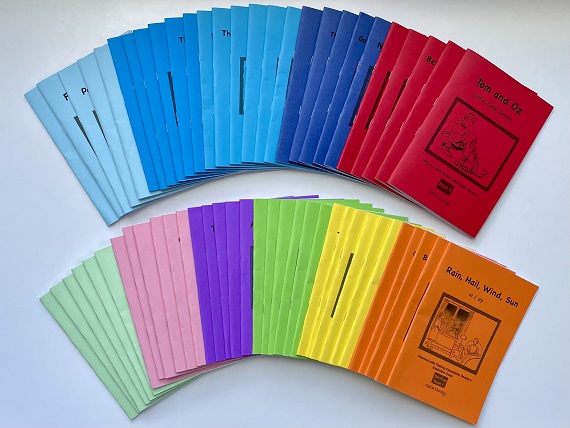The similar-looking word test
43 Replies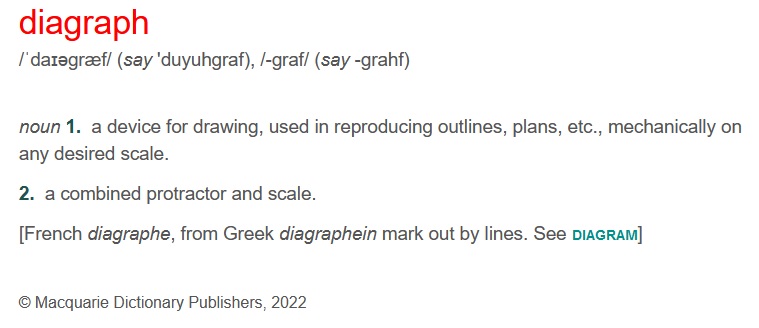
Clients who seem to read well, but spell poorly, are often referred to our service.
Their word-level reading is rarely as good as it seems. While they’re reading connected text, they’re relying on their oral language skills to help them identify the words. Take the supporting context away, by asking them to read lists of words, and they’re usually much less accurate. Their pseudoword decoding/word attack is also often quite weak.
(more…)New printable decodable books, including an extra free one
2 RepliesTo celebrate the removal of predictable texts and multicueing from the Australian National Curriculum (yippee!), more Phonics with Feeling printable decodable books are now available from the Spelfabet website.
These provide an affordable way to help Year 1 and 2 students, advanced Foundation students, and slightly older strugglers to build decoding skills. They are longer than most decodable books, allowing for cohesive narratives, entertaining plots, engaging characters, and themes worth talking about.
(more…)New 2 ways to spell vowels cards, including a free deck
0 Replies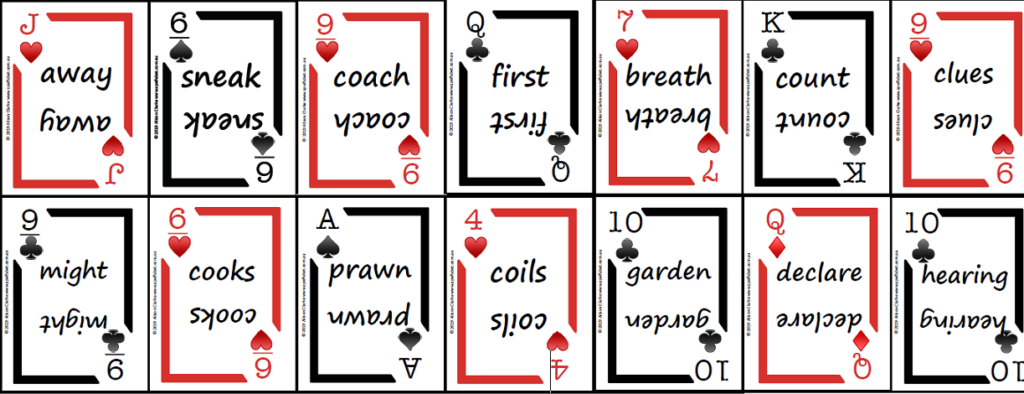
Some students need smaller-than-average steps and extra practice to get spelling patterns into long-term memory. Games are a great, nag-free way to get in lots of targeted, extra repetitions.
The newest set of download-and-print Spelfabet phonics playing cards has 14 decks, each with one vowel sound spelt two ways, and includes a free sample deck:
(more…)Context can reduce accurate word learning
15 Replies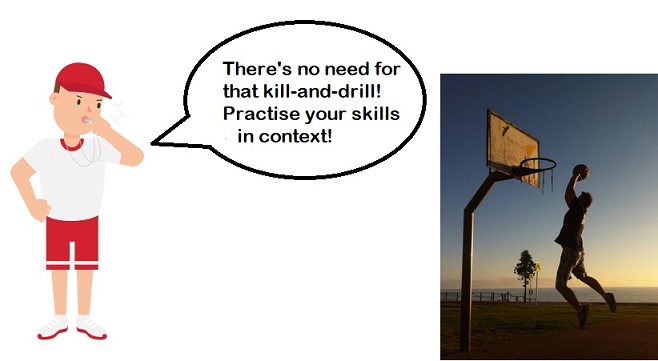
I’ve been reading an interesting 2017 dissertation by US researcher Reem Al Ghanem in preparation for this month’s DSF conference. It’s about how children learn to read and write polysyllabic words.
One section jumped out at me, because multi-cueing and the idea that phonics/word study should occur in context is still popular in many Australian schools:
“When poor readers rely on context to aid word recognition, they focus on selecting semantically appropriate words given the context clues rather than decoding the words through letter-sound conversion strategy.
“When children utilize a compensatory strategy like contextual guessing rather than phonological decoding to aid their word recognition, their attention to word form is limited, resulting in poorer acquisition of word-specific representations, hence the negative context effects.
“When poor readers are presented with words in isolation, they are forced to read them using phonological decoding. Although inefficient, their phonological decoding of the words increases their attention to the orthographic details of the words, resulting in acquiring higher quality representations for the words than when they are presented in
context.” (p103)
Developing high-quality word representations is a challenging activity for struggling readers. Expecting them to only learn words in context is a bit like asking them to only learn to shoot netball or basketball goals during a real game, and discouraging goal-shooting and other skills practice.
As a weedy, unco, asthmatic kid keen to avoid on-court humiliation, I voluntarily did many hours of goal-shooting practice. Imagine if coaches discouraged such practice, and said sporting skills should only be learnt in the context of real games. We’d all stare at them. Then ignore them.
Al Ghanem’s dissertation goes on:
“While context clues can support comprehension, they are unreliable sources for orthographic learning. Teachers must select the instructional strategy that fits the goal of instruction, and presenting words in isolation appears to be the most beneficial when the goal of instruction is acquiring word-specific representations.” (p107)
Affordable basic phonics kit
6 Replies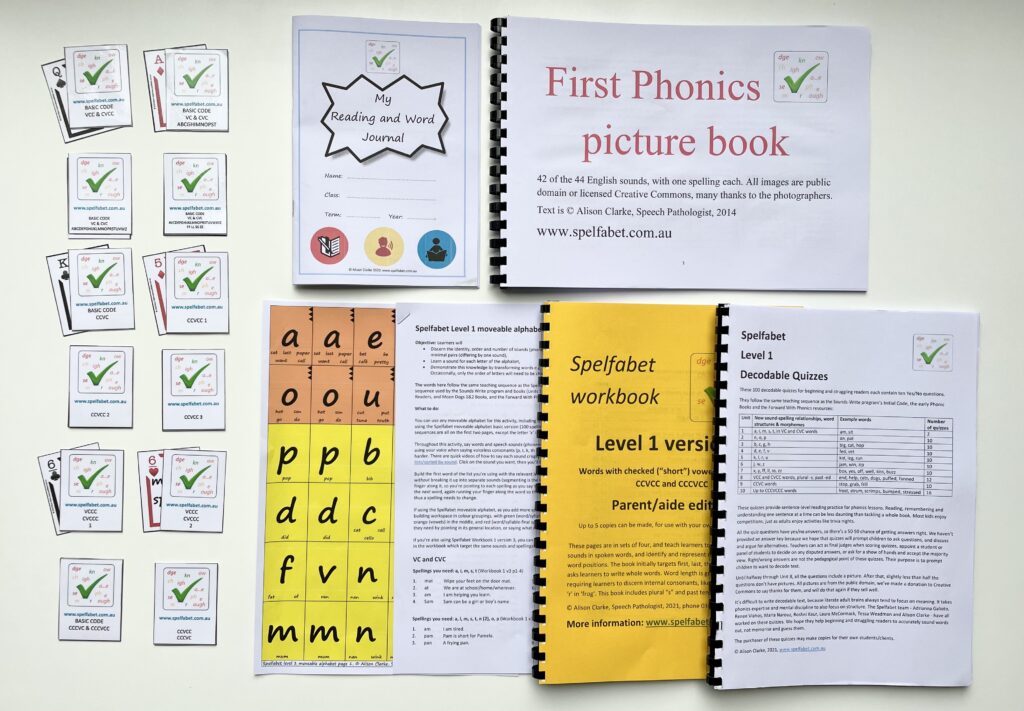
Thanks to the pandemic, many children seem to have done year or more of disrupted schooling without having learnt to read or spell much. A new batch of Australian five-year-olds start school soon, where many will (happily) be taught the systematic, explicit phonics that’s helpful for all, harmful for none and crucial for some*, but many won’t.
The download-and-print Spelfabet Level 1 kit aims to equip you to help beginners and strugglers of any age learn to read and spell one-syllable words with up to seven sounds. The kit follows this teaching sequence (the same as the Sounds-Write program):
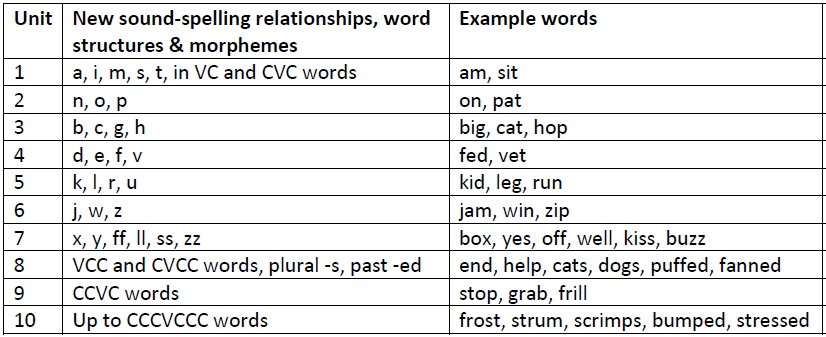
The kit contents are a workbook, quizzes, moveable alphabet, word-building sequences, playing cards, reading journal and phonics picture book. The only difference between the parent/aide kit and the teacher/clinician kit is how many copies of the workbook you may print (5 or 30 copies).
All the items in this kit are available separately from the Spelfabet website, except the simplified Moveable Alphabet, which contains only the spellings needed for Level 1. However, it’s cheaper to get the kit than each item separately ($55 including GST for the parent/aide version and $65 for the teacher/clinician one).
Decodable books for reading practice which follow the same teaching sequence include the Units 1-10 Sounds Write books including free e-books, the Units 1-10 Dandelion and Moon Dogs books from Phonic Books, and the printable Drop In Series Levels 1 and 2.
If this kit is too basic for your learner(s), more difficult kits will be available soon.
* See article by Catherine Snow and Connie Juel (2005) at https://psycnet.apa.org/record/2005-06969-026
“These are just books kids can read!”
9 RepliesMy new favourite thing is an interview with US mum Jennifer Ose-MacDonald, about how she worked with her local library to create a collection of decodable books. It’s on the excellent Teach My Kid To Read YouTube channel.
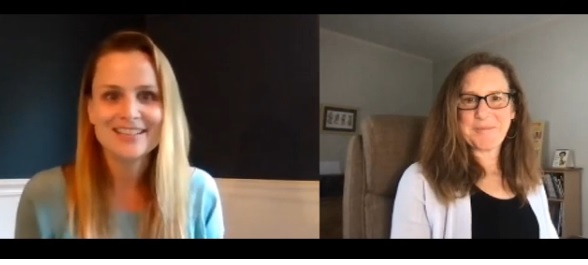
Jennifer took action after she discovered that her local libraries only had books for beginners and strugglers full of too-hard “bomb words” which deflate their reading confidence. Bomb words. A term we need, I’ll be using it a lot. Brilliant.
Jennifer says (just after the 10 minute mark, if you don’t have time to watch the whole 15 minutes) “there’s a lack of understanding in the general population about what a decodable is, because it has a name, people think that it’s special, or that it’s only for a select group of people, and that’s a misunderstanding of what they are. So I think my new role is helping people understand that THESE ARE JUST BOOKS KIDS CAN READ! That’s all they are, they’re books kids can read. And if you want kids to read books, why don’t you look at these? And you’ll see that if you pick the books that are at the right skill level, they can get through a page without having to stop and get frustrated over a word that shouldn’t be there in the first place”.
This is the first in what looks like a series of videos, so I look forward to the next one.
We all want children to experience the joy of reading. Typical books for beginners offer joy and hope, but that hope is too often dashed. Decodable books offer joy and confidence.
Thanks to Heidi from Dyslexia Victoria Support for pointing out this video, and to the people at Teach My Kid To Read for making it. It made my day, I hope it made yours too.
New printable decodables and free quizzes
11 RepliesI’ve just made free follow-up Wordwall quizzes for all the Phonics With Feeling decodable readers, including three new Extended Code Set 1 books now available (update January 2022: There are now 5 books in this set).
The 41 quizzes, of ~20 questions each, are all in a folder called Phonics With Feeling here. I’ve also made printable versions without pictures, which you can download for free here.
The online quizzes are made in the basic Wordwall Quiz format, but you can use them in Gameshow Quiz format for a few more bells and whistles, which many children enjoy, though the timer freaks some highly anxious children out. Click at the right of the startup screen if you want to switch to Gameshow format:
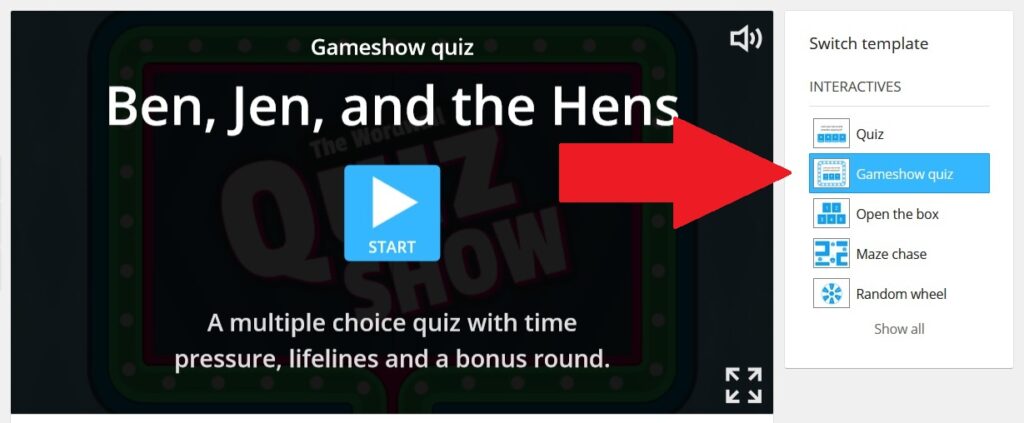
Click on the Share button below each quiz to set it as an after-reading assignment.
The quiz questions are comprehension/concept questions about the Phonics With Feeling readers, which provide extra Really-Nail-That-Pattern practice for children in Years 1 or 2, or slightly older struggling learners. The Initial Code readers are also suitable for many children approaching the end of their first school year (we Victorians call them Preps). Each quiz is written at the same decoding level as the relevant reader.
The quizzes contain some deliberate garden path questions, and traps for picture-guessers and kids inclined to read the start and end of words, and guess the middles, e.g. “Did Red Hen make a net?” followed by “Did Red Hen make a nest?” I hope this makes skimming kids do a double-take, and look more closely at ALL the letters.
The three new Extended Code Set One Phonics With Feeling readers look like this once you’ve printed them with nice coloured cardboard covers:
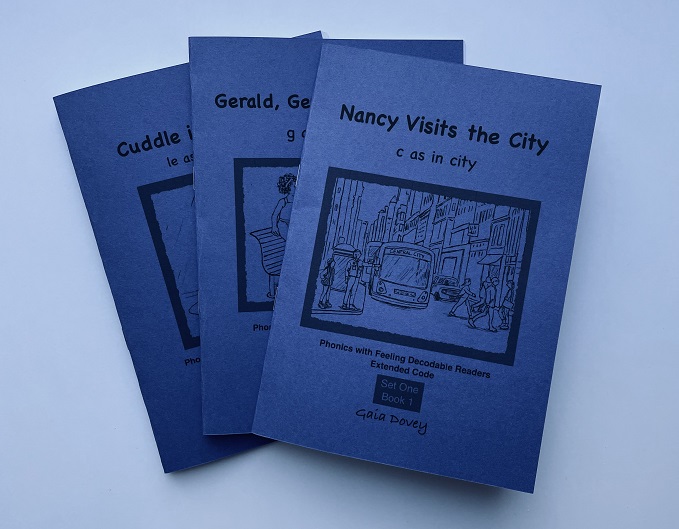
These new books target:
- /s/ as in ‘cent’ (spelt C),
- /j/ as in ‘gem’ (spelt G) and
- Unstressed final syllable ‘le’ as in ‘candle’ and ‘middle’.
Like all the other Phonics With Feeling books, the Parent/Aide version allows you to print up to 5 copies of each book for 40c per copy, plus printing and materials costs.
If you want to use the books with a whole class or caseload, the Teacher/Clinician versions allow printing of up to 30 copies of each book, which works out at 20c per print. We hope this allows teachers to use them as class sets, and have a few spares to replace any that get lost, leaked on by drink bottles, chewed by puppies etc.
The download-and-print quizzes don’t have pictures, and may be useful as follow-up paper-based activities, or you might like to turn the questions into Kahoot!s, or other games/competitions. If my quizzes are too long for your students, just leave some of the questions out, and tweak the remainder. Save yourself the brain-frying experience of writing decodable text from scratch.
40 Phonics with Feeling books are currently available, but I’ve made 41 Wordwall quizzes, because the last Set Seven book has two stories in it – ‘Sue and the Glue’ and ‘Robot Andrew’. The Phonics With Feeling Extended Code Set Three should be available in November, and will target single-letter ‘short/long’ vowels, providing children with many opportunities to practise ‘flipping’ vowel sounds till they get a word they know that makes sense in context (e.g. the ‘o’ in ‘poster’ and ‘roster’).
Still too hard for your learners? Try the new, free Sounds-Write texts
If these books and quizzes are too hard for your kids, and you need more basic decodable texts, Sounds-Write has a cute new free e-book First Steps Collection about strange pets (including a bug, a fox, a crab, a skunk, a moth, a chimp and a squid), for Units 4-11 of Sounds-Write. They’re a bit easier than the original Sounds Write books. Printed versions are also available, though I think at the time of writing they haven’t yet arrived at Australian suppliers DSF, Soundality or Rise Literacy.
If even those books are too difficult for your learner, we’ve made some 10-question WordWall quizzes for Sounds-Write Units 1-3:
- Unit 1 (I realised two of my local MPs are called Tim and Sam, so it’s nonfiction quiz)
- Unit 2 (the featured Pam is Prof Pamela Snow, again very much nonfiction)
- Unit 3.
We’re working on quizzes for later units now, if you can smell our brains frying.
Hope you find at least some of this useful, especially those of you who are still (like us, sigh) in COVID-19 lockdown. Stay well!

